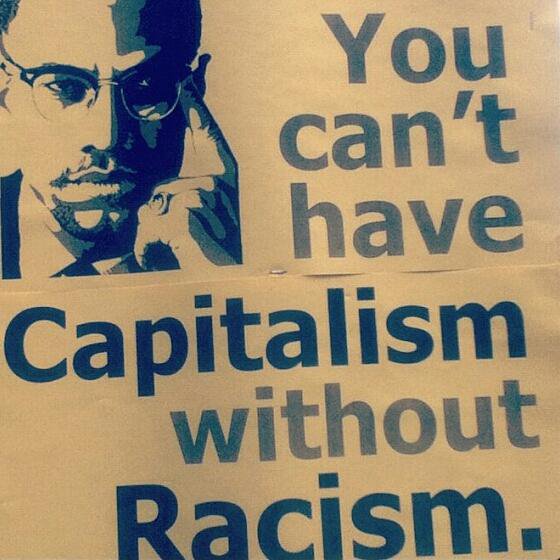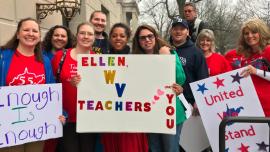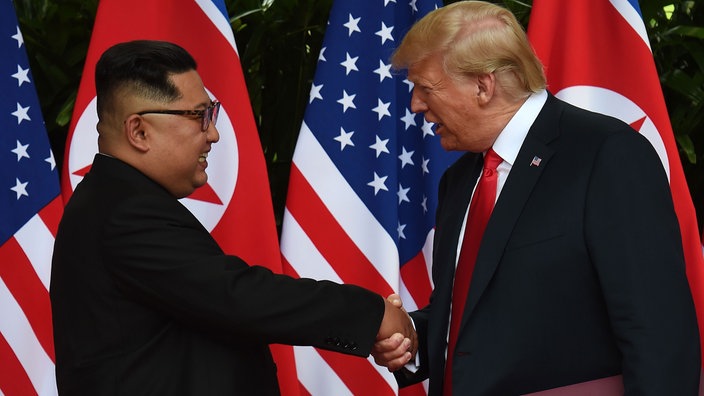Current IssueFrom the Editors
After protests and occupations temporarily shut down ICE offices, Donald Trump suffered a significant political defeat when he was forced to reverse himself on separating immigrant children from their parents after they were arrested at the border. By and large, people were horrified at the separation of kids from their families and at the creation of what were basically prison camps for children. Polls showed that only about a quarter of the U.S. population supported Trump on this child-hostage policy, though about half of Republicans did. Walkouts Teach U.S. Labor a New Grammar for Struggle
Like the Arab Spring, the U.S. “Education Spring” was an explosive wave of protests. Statewide teacher walkouts seemed to arise out of nowhere, organized through Facebook groups, with demands for increased school funding and political voice for teachers. Though the walkouts confounded national media outlets, which had little idea how to explain or report on the movements, for parent and teacher activists who have been organizing against reforms in public education over the past four decades, the protests were understandable, if unexpected. What was surprising was their breadth of support (statewide), their organizing strategy (Facebook), and their breathtakingly rapid spread. What’s Left of the Brazilian Left?Reasons for Cautious Optimism from the Landless Workers Movement
In May 2017, Left politics in Brazil were pretty bleak. It was almost a year after the impeachment of President Dilma Rousseff of the Brazilian Workers Party (PT), whose ousting from power brought along with it an onslaught of austerity policies.2 "Marxism and Freedom" After Sixty Years, For Yesterday and Today
It is the sixtieth anniversary of Raya Dunayevskaya’s Marxism and Freedom, a work both of its time and ahead of its time. Reconnecting Reform and Revolution: Socialists in the Mist
If one thing was clear coming out of the New York City Democratic Socialists of America’s May 5 convention, it was that most delegates uniformly consider themselves socialists and aspire to build an anti-corporate resistance movement nationwide. So far, so good. Black Neighborhoods MatterAn Interview with Lawrence Brown on Community Trauma and Healing
Lawrence Brown associate professor of public health in the School of Community Health and Policy at Morgan State University. He is the grandson of sharecroppers who lived in the Mississippi Delta and a native of West Memphis, Arkansas. He is a historian, critical geographer, and political economist who sees public health from a critical, interdisciplinary perspective and advocates for holistic approaches to healing the Black communities of Baltimore. His book The Black Butterfly: Why We Must Make Black Neighborhoods Matter (Johns Hopkins Press) is forthcoming. Battleground SeattleA Clash of Classes and a Brewing Perfect Storm
Inequality Was Increasing Before Trump
The Federal Reserve Board, the bankers’ bank, has put out figures and reports showing that even before the Trump regime, the rich were acquiring a larger share of the nation’s total income and wealth. The September 2017 Federal Reserve Bulletin reports that “the distribution of income and wealth has grown increasingly unequal in recent years.”1 Other government reports show that many continue to live in poverty and lack shelter and an adequate amount of food. Our Passive Society
Sitting alone in my room watching videos on YouTube, hearing sounds from across the hall of my roommate watching Netflix, the obvious point occurs to me that a key element of the demonic genius of late capitalism is enforcing a crushing passiveness on the populace. Socialism as Pacifism
At time of writing, we are still in the dissipating wake of another mass shooting in the United States, this time in a Parkland, Florida, high school. The American people are once again reminded of the ubiquitous threat of violence that characterizes their everyday lives. We are once again confronted with the nauseating reality of a two-party system that defends this violence in word and deed—while providing rhetorical paeans to security, freedom, and safety. Libya under Gaddafi
A CNN report last November about slave auctions in present-day Libya shocked the world.1 The existence of these slave auctions was widely treated as a new development in the country and a result of the chaos that resulted from the NATO-supported overthrow of Colonel Muammar Gaddafi. In truth, however, what CNN discovered is but a surviving remnant of Gaddafi’s regime—the Libyan Arab Jamahiriya—a police state with systematic racism and abuse both of Libyans of sub-Saharan African descent and of sub-Saharan African migrants. Political Visual Narrative
This season’s roundup of nonfiction comics includes self-published and small-press titles as well as noteworthy releases from major trade publishers. Topics covered range from consumer capitalism and imprisoned anarchists to Trinidadian social history and the war in Syria. Each of these titles deploys a distinctive approach to the challenge of folding political themes into visual narrative. In different ways, these books suggest that the forward march of political cartooning continues unabated. What I Saw at the (Political) Revolution
Radical America
Why the United States has not developed a permanent socialist movement has perplexed activists and theorists for more than a century. Paul Le Blanc takes up that query as an activist who wants to see an anti-capitalism mass movement take shape in twenty-first century America. To that end, he investigates some of the moments when the possibility of a significant left presence in the United States seemed at hand. He focuses on what made those movements viable and what thwarted their long-term success. The volume’s fourteen essays were written over a period of thirty years, from 1986 to 2015. Class DOES Matter
Steve Fraser is a weathered veteran of the New Left and many subsequent movements, author of shrewd books on the acquisitive ruling class and also of the outstanding biography of famed left-leaning labor giant Sidney Hillman, among other works. Here he once again ranges far, but also comes close to home, his own personal home space. Labor and the South
More than a hundred years ago, the muckraking journalist Upton Sinclair worked undercover for several weeks in the cattle slaughterhouses of Chicago. The result was his melodramatic but revelatory novel The Jungle, a work Jack London called the “Uncle Tom’s Cabin of wage slavery.” Sinclair’s narrative depicted the brutal working conditions endured by East European immigrants on the killing floor, engaging in back-breaking, dangerous, and tedious labor for subsistence wages. 1968: The Year of Dangerous Living
— Reprinted from New Politics, vol. II, no. 2 (new series), #6, Winter 1989 — Introduction By Martin Oppenheimer “The Year of Dangerous Living” was written for the twentieth anniversary of 1968. The “’68ers” were still young in 1988, in the prime of their lives, and memories were fresh. There was an explosion of protests against campus racism, gay-bashing, and increasing corporatization of universities (including union-busting). These baby-boomers, then hitting the big 4-0, were nostalgic. There was a sense that despite a Republican president, the moment was ripe for new efforts that required a serious appraisal of past campaigns. The 1968 Columbia Rebellion
— Reprinted from New Politics, vol. VI, no. 3, #23, Summer 1967 (printed June 1968) At 4 am on April 30 [1968], my wife and I stood with tears streaming down our faces on the corner of Amsterdam Avenue and 117th Street, watching the last of the Fayerweather Hall sit-ins being tossed into waiting police vans. We were not the only ones crying, nor were the tears merely those of pity or self-pity. There was also anger, frustration, and actual joy. The incredible—and inevitable—had happened; the “Big Bust” had come. Seven hundred and twenty student and faculty protesters were under arrest; more than 130 had been beaten up, some quite badly. The last illusions about what was happening were shed. |
Blogs & On-Line FeaturesThe Fires This Time and Their Implications for Ecosocialists
Mexican Independent and Democratic Auto Unions Form a New Federation
Mexico’s auto workers are for the first time forming a national federation in what is a very significant development both for Mexican labor and for Mexican society as a whole. Ten organizations representing over 25,000 Mexican workers have committed to the new organization. NYC DSA's Endorsement of Cynthia Nixon: A Reply to Dan La Botz
I appreciate Dan La Botz' well-reasoned article, but do not agree with his conclusion. As usual, Dan's argument is judicious and clear, courteous to other points of view. Such civility is essential to maintaining the health and vitality of a diverse big tent organization like the Democratic Socialist of America (DSA). Youth and Our Future: An Era of Superficial Outrage Politics?
Many would like to believe that this American period of rampant national-conservatism is nothing more than a short stay in Republican purgatory. It is a reassuring idea that in a few years, as today’s progressive youth becomes a large part of the electorate, the United States will become a shining example of tolerant and progressive prosperity. Just as neo-conservatives envision a global American hegemony built on capitalism and military strength, some progressives have adopted a belief that the United States is destined to reach national political moksha with strong welfare, a prosperous middle class, and minority rights; the nasty racists and homophobes, the “deplorables”, will soon be outnumbered so vastly in the face of common-sense political ideology that the right will simply cease to exist. Unfortunately, this prophecy has proven a myth for millennials—and the nascent Generation Z doesn’t appear to have better prospects. A Massacre, Not a Coup: A Response to Misinformation on Nicaragua
For the past 3 months, progressive websites and journals have run articles that paint a picture of the crisis in Nicaragua that is dangerously misleading. Many of these articles have been circulated among people on the left who were in solidarity with Nicaragua and the FSLN during the 1970s and 1980s but haven’t kept up with what has happened over the last 30 years—particularly since 2007, when Daniel Ortega returned to the Presidency and has been there since. I’d like to take a moment to correct some misconceptions about the current crisis in Nicaragua. Return of the Strike: The Teachers Rebellion in the United States: A Forum
A Forum on the Teachers Rebellion in the United States with Tithi Bhattacharya, Eric Blanc, Kate Doyle Griffiths, Lois Weiner. Edited and introduced by Jeffery R. Webber Few anticipated a labour upsurge in the United States in early 2018, and fewer still expected a blaze to ignite among teachers in West Virginia, or for it to spread to Oklahoma, Arizona, Kentucky, and Colorado. Ellen David Friedman poses one of the questions which immediately springs to mind: “why is this stunning revolt occurring where unions are weak, where labor rights are thin, and where popular politics are considered to be on the Right?”[1] The Third Camp in Theory and Practice: An Interview with Joanne Landy and Thomas Harrison
[Reprinted by permission from Left History 21.2] Introduction Joanne Landy (1941–2017) and Thomas Harrison (1948–) became socialists as teenagers and have remained involved in the democratic left ever since. They were active in the student protest movement at the University of California at Berkeley in the 1960s, where they met and became close friends and collaborators. During the 1970s, they became increasingly interested in the issue of labor rights in Central and Eastern Europe, and they worked to link democratic and social justice struggles in the Eastern Bloc with social movements in the United States, the West, and the Third World. Until Joanne Landy’s death in October 2017, they were co-directors of the Campaign for Peace and Democracy (CPD), which was founded in 1982. Initially, the organization was called the Campaign for Peace and Democracy/East and West, but with the end of the Cold War the title was shortened. Siege and resistance in Gaza: an interview with Toufic Haddad

For more than 10 weeks, Palestinians have gathered in protest every Friday at the Israeli-Gaza Strip buffer zone, located in the perimeter of the 1949 armistice lines. Called by organisers the Great March of Return, the mobilisations have demanded an end to the crippling Western state-Israeli economic and political blockade of the Gaza Strip and that families expelled for generations from their homelands be allowed to return. The Movement-Building Potential of Socialist Electoral Victories
On June 26th, Alexandria Ocasio-Cortez defeated, against all odds, the incumbent Congressman from New York’s 14th district, a safe Democratic seat, in the party’s primary. Spectacular as it was to see a Democratic political boss (the “King of Queens”) humbled by a left-wing challenger, the real spoils of this victory do not lie in the House seat itself. The Rebirth of Social Democracy in the U.S.
The Democratic Socialists of America (DSA) has emerged as the largest socialist organization in the United States since the collapse of the Communist Party (CP) in the mid-1950s. While Bernie Sanders’ ‘democratic socialist’ campaign for president in 2016 laid much of the groundwork for DSA’s growth, it was Donald Trump’s election to the presidency that boosted its membership from 6,700 in 2016 to around 48,000 members today. Nicaragua’s Popular Rebellion Stopped—For Now
What is the state of the popular rebellion in Nicaragua? What brought about the rebellion? Who is involved in the rebellion? Who are the most important national and international actors? And what is the nature of the Left’s debate over Nicaragua? President Daniel Ortega’s government has succeeded—for now—in stopping the Nicaragua’s popular rebellion after four months of the most severe repression, including killings, kidnappings, and torture of the regime’s opponents by both the police and paramilitary forces.
Taking Some Distance from Dan La Botz's Demurrer of the DSA Endorsement for Cynthia Nixon
Dan's sober and sobering comment on why he opposed an endorsement by DSA of the Cynthia Nixon campaign to dethrone Andrew Cuomo, New York's corporate deny-the-corporate-class-nothing's two-term governor [see "Why I voted Against Endorsing Cynthia Nixon"] is sharply and smartly posed. It deserves a similar if brief reply, one crafted in what I hope encapsulates the same spirit.
Why Humanism Matters in the Fight Against Capital
Whither Korea?
After the Singapore meeting between Trump and Kim Jong-un, questions loom large. What is the path ahead for North Korea? What chances are there for a lasting peace on the Korean Peninsula? South Korean socialists weigh in. Race, Capitalism, and Resistance in the United States
 Introduction and My Experiences “It is our duty to fight for our freedom. It is our duty to win. We must love and protect one another other. We have nothing to lose but our chains”. You may recognize this as the rallying cry for the Black liberation movement in the United States, as written by Assata Shakur. |






 Labor is prior to, and independent of, capital. Capital is only the fruit of labor and could never have existed if labor had not first existed. Labor is the superior of capital and deserves much the higher consideration. - Abraham Lincoln
Labor is prior to, and independent of, capital. Capital is only the fruit of labor and could never have existed if labor had not first existed. Labor is the superior of capital and deserves much the higher consideration. - Abraham Lincoln




 This memoir of sorts by Fordham University sociology professor Heather Gautney, who became a policy fellow in Bernie Sanders’ Washington DC office and a volunteer researcher and organizer for his unexpectedly popular 2016 presidential campaign, has a very specific focus: to “offer insights from up-close work with Bernie, mixed in with historical and sociological analysis, to perform an autopsy of the 2016 election” (2). Given the sheer number of insightless (to put it mildly) autopsies that have been proffered across the political spectrum—perhaps none more useless than Hillary Clinton’s own What Happened (Simon & Schuster, 2017)—Gautney’s book is more than welcome and even slightly overdue.
This memoir of sorts by Fordham University sociology professor Heather Gautney, who became a policy fellow in Bernie Sanders’ Washington DC office and a volunteer researcher and organizer for his unexpectedly popular 2016 presidential campaign, has a very specific focus: to “offer insights from up-close work with Bernie, mixed in with historical and sociological analysis, to perform an autopsy of the 2016 election” (2). Given the sheer number of insightless (to put it mildly) autopsies that have been proffered across the political spectrum—perhaps none more useless than Hillary Clinton’s own What Happened (Simon & Schuster, 2017)—Gautney’s book is more than welcome and even slightly overdue.



 “Deindustrialization.” That’s a word you virtually never hear in the debate around global warming. Not surprising. It’s a word that’s loaded with negative implications: economic collapse, mass layoffs, falling living standards. Who wants to think about those, let alone think about this as a strategy of suppressing CO2 emissions?
“Deindustrialization.” That’s a word you virtually never hear in the debate around global warming. Not surprising. It’s a word that’s loaded with negative implications: economic collapse, mass layoffs, falling living standards. Who wants to think about those, let alone think about this as a strategy of suppressing CO2 emissions?









 Dehumanization is the word that best captures our present moment. How else to describe separating children as young as two or three from their parents and throwing them in cages and detention centers just because their families are fleeing severe persecution? It isn’t just about Trump; it’s also about the tens of millions in the U.S. who are avidly supporting his policies. How could this be happening?
Dehumanization is the word that best captures our present moment. How else to describe separating children as young as two or three from their parents and throwing them in cages and detention centers just because their families are fleeing severe persecution? It isn’t just about Trump; it’s also about the tens of millions in the U.S. who are avidly supporting his policies. How could this be happening?





 This essay was originally a talk at the conference held at the New School for Social Research on April 21-22, 2016.
This essay was originally a talk at the conference held at the New School for Social Research on April 21-22, 2016.